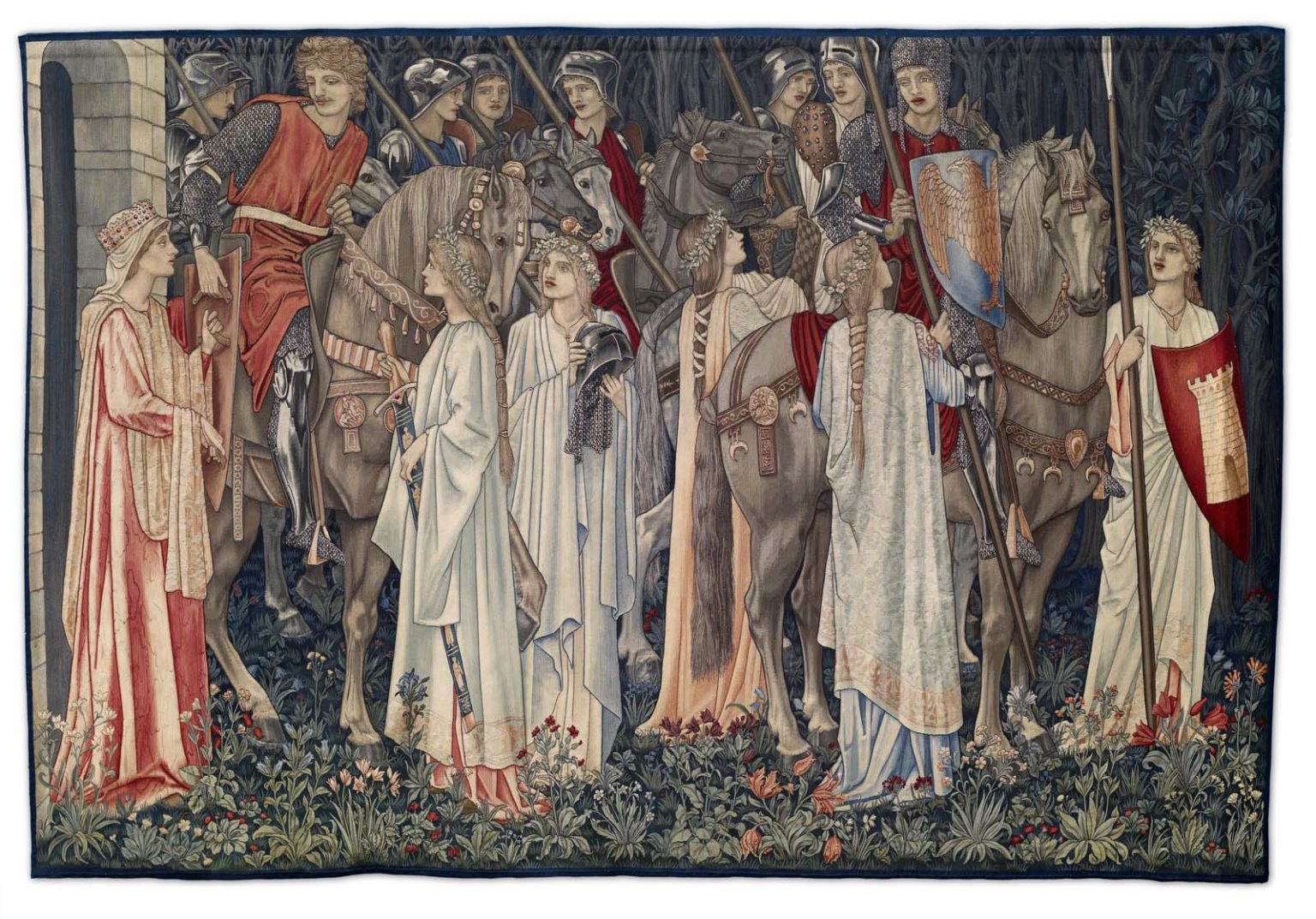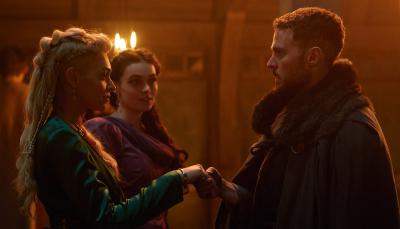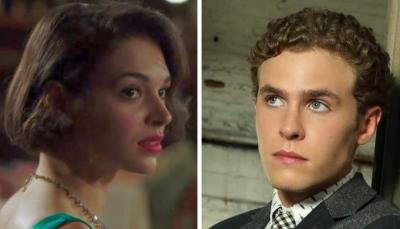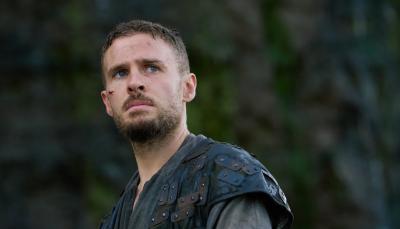Arthur, the Once & Future King of Britain, Rules On Screen In These Adaptations

Rubin Beynon's imposing bronze statue Gallos (power), at Tintagel, Cornwall.
© cornwalls.co.uk
You can barely move in Britain without encountering a site or natural feature connected with Arthur or named after him. Mystical elements, which include the belief that Arthur is sleeping, ready to be woken if Britain is once again in great need, doubtless gave comfort for centuries during times of war and hardship. His story is one that we never tire of, yet we know so little about him and his times. With The Winter King, starring Iain de Caestecker and based on Bernard Cornwell’s Arthurian trilogy, making its debut on MGM+ on August 20, 2023, let's talk about the once and future monarch.
Britain was abandoned by its Roman occupiers in 410 CE, leaving the island open to invaders from modern Germany and Denmark (Saxons and Jutes). Arthur seems to have been a warlord with extraordinary skill in uniting the disparate peoples of what had been Roman Britain, and using what infrastructure remained (forts, roads, cities). The invaders were probably looking for fresh farmland and the raids may have been family affairs with the wives and kids coming along for the pillage. No one wore horned helmets. And no, we don’t call it the Dark Ages, even though there is very little surviving documentation.
Y Goddodin, a Welsh poem honoring the dead of a battle in northern England ca. 600 CE survives as a 13th-century manuscript but the text almost certainly dates from much earlier. It has the first mention of Arthur, to whom one of the fallen warriors is compared:
He fed black ravens on the wall
Of the fortress, although he was not Arthur
Clearly he knew his audience would be able to recognize the name without explanation.
Another early mention is from historian Nennius in his History of the Britains (Historia Brittonum) writing in the early ninth century, in which he explicitly mentions Arthur’s battles but denies that he was of royal descent. The title he uses is Dux Bellorum, a war leader. On the other hand, he was writing three centuries after Arthur’s death. In 1136, Geoffrey of Monmouth wrote the Historia Regum Britanniae (History of the Kings of Britain), in which he combined Welsh and Breton folklore and represents Arthur as both a great military leader and empire builder and a heroic fighter against supernatural forces and monsters.
Monmouth introduces all of the familiar elements: The Round Table, Arthur’s father, Uther Pendragon, the wizard Merlin, Guinevere, the sword Excalibur, Arthur’s birth at Tintagel, his final battle against his son Mordred (the result of an incestuous relationship between Arthur and his half-sister) at Camlann (Camelot), and Avalon. The 12th-century French writer Chrétien de Troyes added the Holy Grail to the story, marking a shift from paganism to Christianity, and introduced Lancelot as a representation of romantic courtly love.
But it was Sir Thomas Malory’s Mort d’Arthur which became the definitive version of Arthurian legend, a glorious stew of everything there was to know about the legendary king with a heavy emphasis on French literature, written in the late 15th century and printed by William Caxton. The fascination with Arthur continued, getting a boost with the Victorian revival when Tennyson retold the legends in his Idylls of the King and inspired artists like the pre-Raphaelites and Aubrey Beardsley. The story — battles, magic, revenge, love, sacrifice — has received many film versions, so let’s take a look at them.
1. 'Knights of the Round Table'
Arthur was initially embraced by Hollywood in 1953 with MGM’s Knights of the Round Table, which received the high-tech treatment, providing a rollicking, colorful version. As the trailer says:
With a cast of thousands they immortalize one of the world’s most romantic eras — when knighthood was in flower! In spectacular color and the visual grandeur of CinemaScope. See Knights of the Round Table, for the greatest education experience of your life. See with your own eyes the magnitude and depth made possible by the anamorphic lens of the sweeping CinemaScope screen. Through the wonders of CinemaScope you’ll be one of those present at this memorable event while around you the legendary chiefs and warriors come here as you have, to see Arthur Pendragon receive the enchanted sword Excalibur and so become the rightful king of all England.
It’s firmly set in the medieval period since it’s based on Malory’s Le Morte d’Arthur (whose name appears in the credits, bless him, he must have had a great agent); the movie stars Robert Taylor as Arthur, Ava Gardner as Guinevere, and Felix Aylmer as Merlin.
2. 'Camelot'
Promising magnificent musical entertainment, Camelot brings a heavily mascara’d Richard Harris (Arthur) singing and chewing the scenery, Vanessa Redgrave in a lot of sparkly clothes as Guinevere and the hunky Franco Nero as Lancelot. Joshua Logan directs, and Alan Jay Lerner/Frederick Loewe provided the book and music, using some of T. H. White’s material from his The Once and Future King trilogy (the first of which, The Sword in the Stone, was given the Disney treatment two years earlier).
Based on a highly successful stage version, it didn’t translate that well to film and doesn’t really bring any depth to the love triangle that destroys Camelot. It’s always interesting to see Redgrave early in her long and eventful career, and her radiant performance may be partly because, in real life, she and Nero fell in love while filming. Yes, it is a very silly movie. They do indeed sing a lot, but it has its charms, and the Botticelli-inspired scenarios are just gorgeous.
3. 'Arthur the King'
CBS’s 1985 made-for-TV movie Arthur the King, also known as Merlin and the Sword, was described by one critic as “... quite possibly the worst adaptation of the legend of King Arthur and Camelot ever to be recorded on film ... an absurd, overacted mess.” Aiming for a light-hearted take on Arthurian legend, it tells the story of American tourist Katherine (Dyan Cannon), who falls into Merlin’s pit (not a euphemism) at Stonehenge and is transported to Arthurian times. Silliness ensues.
The most interesting thing about this movie may be the number of well-known names involved, including Rupert Everett (Lancelot), Malcolm McDowell (Arthur), Liam Neeson (Grak), and Candice Bergen (Morgan Le Fay), whose careers somehow survived and thrived. One to miss.
4. 'First Knight'
Based on the preposterous theory that Guinevere (Julia Ormond, Gold Digger) would turn down hunky silver fox Sean Connery (King Arthur) for slick Richard Gere (Lancelot, a legendary peasant-born wandering swordsman), First Knight was written by William Nicholson (2012 Les Miserables, Gladiator) and directed by Jerry Zucker (Airplane!).
Arthur, about to be married, finds his throne threatened by Prince Malagant (Ben Cross), a disgraced former Knight of the Round Table. Unusually this version does not have Merlin or any mystical elements, but has lots of fighting and a generic medieval feel.
5. 'King Arthur'
Writer David Franzoni and director Antoine Fuqua make a serious attempt to crack the Arthur code, with the simply titled King Arthur. taking us back to the post-Roman occupation period with Arthur and his knights as former Roman cavalry soldiers. The man-eye-candy trio of Clive Owen (Arthur), Ioan Gruffudd (Lancelot), and Hugh Dancey (Galahad) star, along with the late Ray Stevenson (Dagonet), and Stephen Dillane as Merlin, who is not a magical figure but a Celtic chieftain.
Keira Knightley, who frequently looks as though she needs a cardigan in the atrocious weather, is a babe-with-a-bow Guinevere. The scenery around Hadrian’s Wall is stunning and there's a terrific battle scene on an icy lake. Again, not for those who yearn for medieval goodness and magic swords, but it’s well done in its way.
6. 'King Arthur: Legend of the Sword'
Written and directed by Guy Richie and starring Charlie Hunnam, King Arthur: Legend of the Sword is an idiosyncratic, hip interpretation where Arthur is orphaned after his uncle Vortigern (Jude Law) kills his parents and seizes the throne. Street-wise Arthur is raised in a Londinium (London) brothel, unaware of his origins, until Vortigern challenges the young men of the kingdom to draw Excalibur from the stone. Inexplicably there are Vikings around.
Despite all the hype and a guest appearance by David Beckham, the film bombed. If you enjoy the frenetic energy of Richie’s directing style, you may well like this movie. Again, lots of fighting, special effects, and monsters, including the Lady of the Lake as a sort of octopus.
7. 'The Green Knight'
"Capitalising on leading man Dev Patel’s uncanny ability to embody a combination of weakness and strength, wretchedness and valour, Lowery’s haunting epic takes the viewer on a mythical quest, replete with flaming heads and eerie giants." The Guardian.
Based on a 14th-century chivalric romance in Middle English, but adopting elements of Welsh, Irish, and French Arthurian lore, The Green Knight is the story of Sir Gawain (Dev Patel), Arthur’s nephew. Gawain accepts a challenge from a mysterious Green Knight who arrives in Camelot for Christmas fun — a beheading game. Gawain, using the green knight’s axe, beheads him, and the green knight puts his head back on and challenges him to try again in one year.
Gawain undertakes a heroic quest to find the knight, encountering adventures, temptations, and challenges along the way. A spectacularly beautiful film, it also stars Alicia Vikander and Joel Edgerton, and is written and directed by David Lowery.
8. 'Monty Python & the Holy Grail'
You can’t expect to wield supreme executive power just because some watery tart threw a sword at you.
Saving the best for last. Bring out the coconut shells and the swallow jokes! Fed up with history being taken too lightly? Say no more! Directed by Terry Gilliam and Terry Jones (a published medievalist who presented several BBC documentaries on the period) and written by all the Monty Python gang, with Graham Chapman as the earnest King Arthur, Monty Python & The Holy Grail holds up well as it approaches the 50-year mark. Either you love it (and can quote endlessly from it), or you think it’s just too silly.
Do you have a favorite Arthur retelling? It's an indication of how ingrained the legends are that movie and TV versions are produced year after year (and apologies if we missed your favorite).





